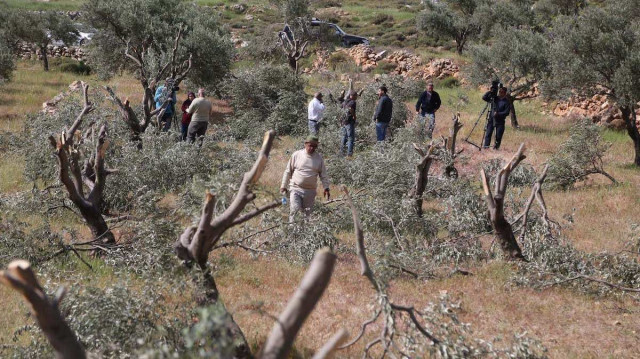
Restrictions to accessing land and widespread settler violence pose major risks and challenges for Palestinian farmers in the olive harvest season, potentially undermining their livelihoods
Illegal Israeli settlers backed by the soldiers have used the war on Gaza to impose extreme restrictions and violence on Palestinian farmers during the olive harvest season. For years, settler violence against Palestinian farmers has peaked during the harvest season, but this year, with the war in Gaza underway, attacks have increased in both intensity and frequency since the Israeli military has enlisted many settlers for regional operations in the occupied West Bank. The settlers have used this power to obstruct Palestinian harvesters by blocking roads leading to the agricultural land, denying them access to olive groves near settlements, and burning and uprooting olive trees. Furthermore, violent assaults by settlers became the main threat to the lives of Palestinian farmers while harvesting olive trees on their land.
- Settler attacks destroy agricultural land and olive groves in the West Bank
The Palestinian Ministry of Agriculture expects that farmers will not be able to access 80,000 dunams (nearly 19,770 acres) of olive-planted land this year due to attacks by the occupation army and settlers, resulting in the loss of about 15% of the season's crop. The 2023 season was difficult for farmers since more than 96,000 dunums of olive groves across the West Bank remained unharvested due to Israeli restrictions on Palestinian access.
Palestinian farmers suffered an estimated total loss of more than 1,200 metric tons (about 1,323 tons) of olive oil in the 2023 season, resulting in a direct financial setback of $10 million. The impact was particularly harsh in the northern governorates of Tulkarm, Qalqilya, and Nablus. This Israeli policy has caused immediate financial harm to tens of thousands of Palestinian families. For instance, in 2023, the olive press in the village of al-Mughayir, which also serves the villages of Kafr Malik, Turmusaya, Abu Falah, and Duma, produced only 20% of the average annual output — 60 tons of olive oil instead of 300 tons. The olive press at al-Mazra'ah al-Qibliyah produced only 500 kilograms (about 1,100 pounds) of olive oil instead of 150 tons. [1]
- Settler violence could undermine Palestinian farmers' livelihoods
Restrictions to land access and widespread settler violence pose major risks and challenges for Palestinian farmers during the olive harvest season, potentially undermining their livelihoods. Since the beginning of the war, hundreds of incidents of settler violence have taken place. These include settlers physically assaulting harvesters while they were picking olives in several areas and threatening them with weapons, forcing them to leave the area. Another case of settler violence is uprooting and burning large groves and stealing olives. Most attacks were carried out under the supervision of Israeli forces.
Settlers have also threatened to harm harvesters on social media. From the beginning of this olive harvesting season, various areas in the West Bank witnessed a series of Israeli settler attacks, with the aim of destroying trees, assaulting Palestinian farmers, and preventing them from gathering their crops. These attacks are concentrated in areas east of Ramallah, south of Nablus, and north of Salfit. While the north of the West Bank has been targeted, attacks continue unchecked in the rest of the region. At the same time, settler attacks on Palestinian agricultural land have intensified.
- The West Bank has witnessed a boom in settlement activity since the beginning of the war on the Gaza Strip
Earlier this year, Israel approved the largest seizure of land in the occupied West Bank in three decades, in a move followed by an unprecedented increase in the number of random settlements and new roads built for settlers. Settler attacks have included organized assaults on land control and the establishment of settlement outposts. Most of these newly expanded settlements are located in agricultural areas mainly cultivated by olive trees.
One example was, in the village of Battir, an agricultural village located west of Bethlehem city in the southern part of the West Bank, where a new settlement was established on the lands of Palestinians in the Al-Khamar area of the town, with settlers also grabbing adjacent parts with the aim of expanding the outpost's borders and installing mobile homes and barracks. This is the second year in a row that farmers in the village have been prevented from reaching their land and harvesting their olives. Settlers have faced no accountability or punishment over these crimes and are instead reinforced by occupation forces on the ground with the support of the Israeli government.
[1] The Humanitarian Situation Update is issued by the UN Office for the Coordination of Humanitarian Affairs (OCHA) Occupied Palestinian Territory, October 2024

